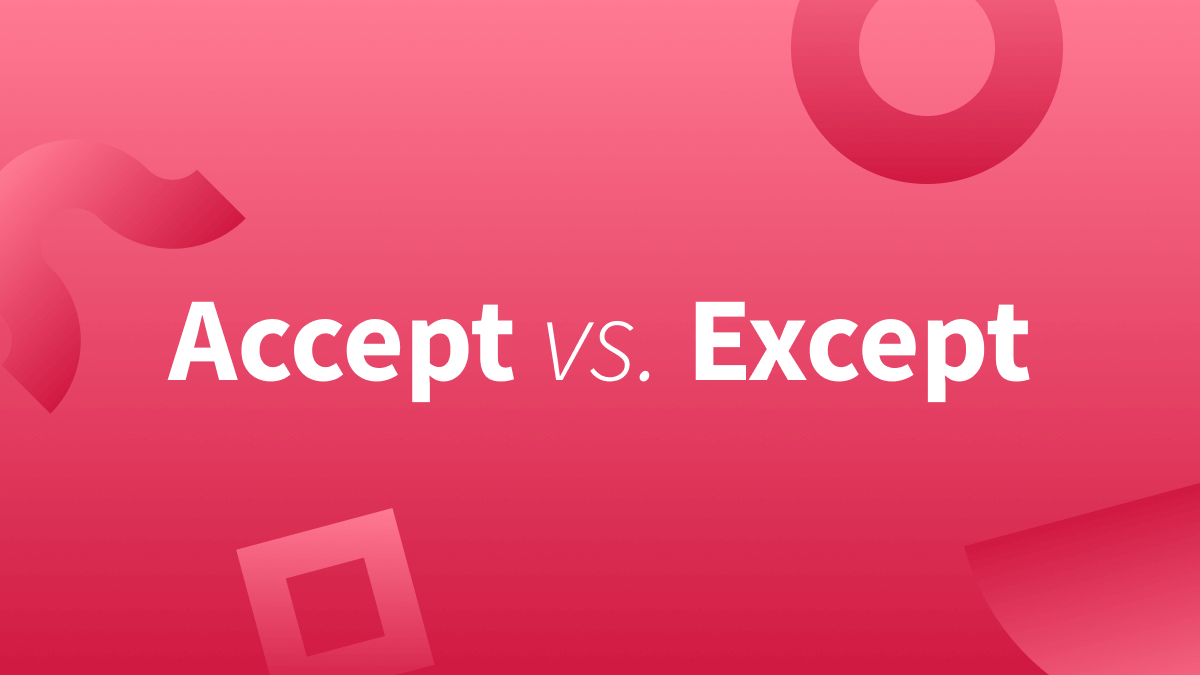What’s the Difference Between “Accept” and “Except”?
- Accept is a verb that means “to receive, approve, or take something willingly.”
- ○ She told me she will accept his invitation to the prom.
- Except is most commonly used as a preposition that means “excluding” or as a conjunction used to help express an exception.
- ○ Blake works every day except Tuesdays.
- ○ I love everything about Sundays, except that Monday follows it.
Is It “Accept” or “Except”?
Whether you’re an English language learner or a native speaker, there’s one thing we all have to accept: English can be puzzling, and there’s no other way around it.
Except that there is. This blog post will teach you the difference between accept and except and fill you in on a secret that makes writing in English a breeze.
What Does “Accept” Mean?
Accept is a verb that has quite a few meanings. It can be used when “willfully receiving something that is offered.”
It was cold, so I accepted his jacket when he offered it to me.
You can also use accept when “agreeing or approving something.”
The company will accept its employees' demands.
Accept is also commonly used “to express that you believe something is true.”
I accepted his excuse because I could tell he wasn’t lying.
If you’re “allowing admittance or welcoming someone into a group,” you can say that you’re accepting them.
We accepted 15 pledges into our sorority.
You can also use the word accept when “agreeing or conceding to something without protest,” or when “regarding something as normal or inevitable.”
We will accept the results, even though we know our competitors cheated.
The country accepts Bokononism as their religion because they know of no other.
Yes, accept has a handful of different meanings, but they’re all somewhat similar: receiving, approving, or allowing something.
What Does “Except” Mean?
Except can function as a preposition or conjunction that refers to excluding something. Here are some examples:
I want everything on my pizza except vegetables. (Preposition)
We almost wore the same exact outfits, except she had brown shoes on, and I had black. (Conjunction)
It’s also occasionally (and less commonly) used as a verb that means “to leave out or not include something.”
The teacher excepted all late assignments from the competition.
The verb form is usually where the confusion comes in. If you mean to say that you left something out, make sure to use except and not accept.
Patients that have been medicated will be excepted from the survey.
Patients that have been medicated will be accepted from the survey.
Using “Accept” and “Except” Correctly
So, if you’re deciding whether to use accept or except, just remember that accept means to approve or receive something, and except means to exclude.
Again, these nuances are something we all have to accept about English. But, a fast and easy way to make sure you never use these words (or any other) incorrectly is by using LanguageTool as your spelling and grammar checker. This advanced multilingual editor will make writing in English (or any other of the 25 languages it supports) easy.

